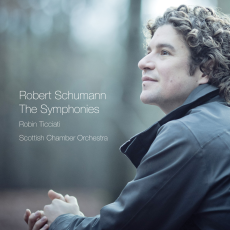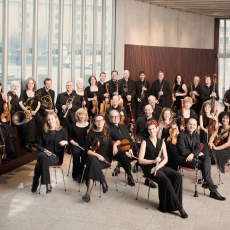Robin Ticciati & SCO - Schumann: The Symphonies - McAlister Matheson Music
Robin Ticciati's new recording of Schumann's four symphonies with the SCO is a real ear-opener. I doubt if there has ever been a recording that has revealed so much detail in Schumann's symphonic scores.
Several things stand out. First, the number of SCO strings used for this project is small: 32 players, when even John Eliot Gardiner's string forces in his period Schumann set number between 40 and 44. This naturally shifts more of the focus towards the wind and brass. Second, Ticciati's favouring of generally slower tempi than have recently been fashionable allows all the subtleties of Schumann's writing to be properly heard and appreciated. (Ticciati's tempi are generally slower than Gardiner and Nézet-Séguin, often more akin to those of Sawallisch in his 1972 recording with the Staatskapelle Dresden.) Third, and perhaps most striking, is the sense that the players are behaving like chamber musicians, interacting with and listening to the others in a way that, say, quartet members do.
The Adagio of the second symphony provides a good example, with expressive lines on strings and wind emerging and retreating in exquisite fashion. The preceding Scherzo demonstrates another feature of this recording - superb articulation at speed, with the staccato woodwind passages in the first Trio contrasting with the deft, silken string playing. The second Triofeatures wonderful legato lines, handled so that the inner part-writing can always be heard. The generally slower speeds do not lead to any loss of tension - in the first symphony's opening moment Ticciati generates a fantastic energy when moving from the slow introduction to the main Allegro, and the build-up of sizzling excitement in the last movement is expertly done.
The horn playing is especially notable throughout the set, resounding gloriously in the acoustic of Perth's concert hall. Punchy trumpets, sweet woodwind, some great timpani playing, focused unanimity and great delicacy among the strings: all are hallmarks of this recording. There is also plenty heft in the sound where required, as shown in the opening movement of the fourth symphony, where the playing is weighty and stirring, but also energised and full of detail.
These are balanced, organic performances of great beauty. As far as comparisons are concerned, Gardiner's set was a trail-blazer and still ranks as one of the best today. I love Yannick Nézet-Séguin's vigorous, almost driven set with the Chamber Orchestra of Europe, issued in March 2014; it emphasised again what great music this is. Robin Ticciati and the SCO have taken yet another path, equally valid and perhaps ultimately more rewarding. Unmissable!


